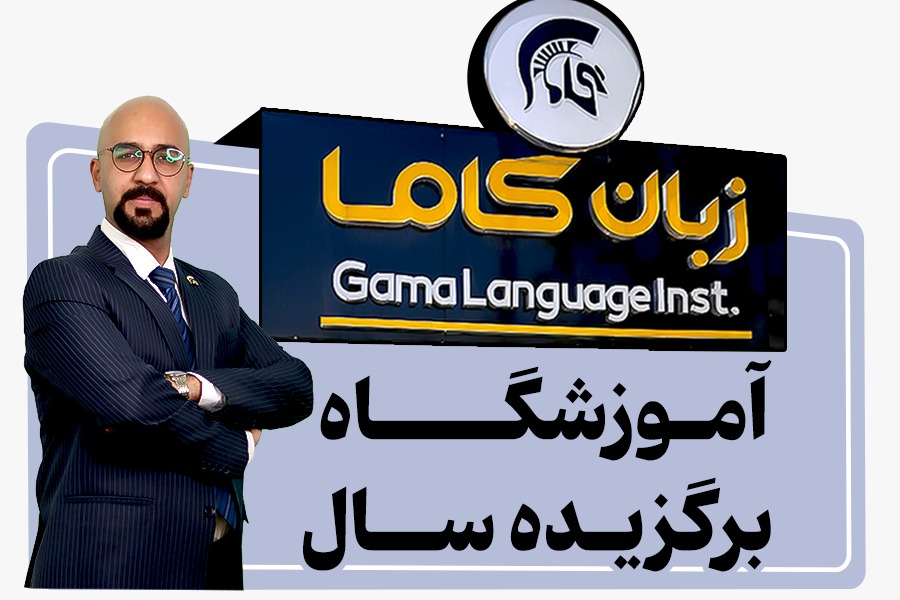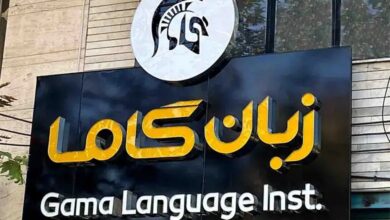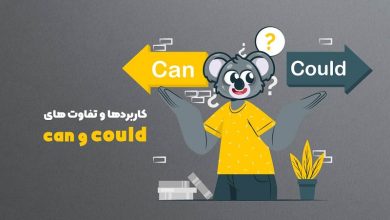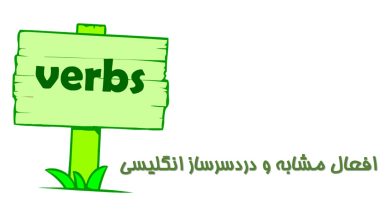گرامر افعال کمکی زبان انگلیسی : Auxiliary verbs چیست؟ مثال + تمرین
قبل از خواندن این مطلب حتما مقاله جمله سازی در زبان انگلیسی را مطالعه نمایید.
| I have to get up at seven every day. She has to speak English at work. | (+) |
| We don’t have to wear a uniform at this school. He doesn’t have to work on Saturdays. | (-) |
| Do I have to buy a grammar book? What time does she have to get up in the morning? | (?) |
یکی از افعال کمکی انگلیسی فعل have to می باشد که در فرم های زیر استفاده می شود.
• برای بیان قوانین و اجبار از (have to+ verb (base form استفاده میکنیم.
• از (don’t have to+ verb (base form برای بیان این موضوع استفاده میکنیم که اجباری وجود ندارد و چیزی ضروری نیست.
• برای منفی و سؤالی کردن از do/ does استفاده میکنیم:
Do I have to go? NOT Have I to go?
• have or has را به صورت مخفف به کار نبرید:
I have to go. NOT I’ve to go.
Must/ must not/ can’t
| You must do your homework tonight. She must clean up her room before she goes out. | (+) |
| You must not leave your bags here. You can’t brig food into the library. | (-) |
فعل must به عنوان یکی دیگر از افعال کمکی انگلیسی در فرمهای زیر به کار می رود.به معانی توجه کنید.
• برای بیان قوانین و اجبار از (must+ verb (base form استفاده میکنیم.
• برای بیان این که چیزی ممنوع است و یا برای وضع یک قانون از can’t/ must not+ base form استفاده میکنیم.
• can’t و must not هم معنا هستند، اما can’t بیشتر در صحبت کردن به کار میرود. میتوانید از can not هم استفاده کنید.
• صرف فعل must/ must not برای تمام اشخاص یکسان است.
• must اغلب اوقات در جملات سؤالی به کار نمیرود (have to رایجتر است).
must and have to
افعال must , have to به عنوان افعال کمکی انگلیسی خیلی به هم شباهت دارند؛ اما have to رایجتر است، خصوصاً در صحبت کردن. must عمدتاً در فرمها، نوشتهها و علائم رسمی به کار میرود.
must not and don’t have to
معانی این دو به طور کامل با هم متفاوت است. جملات زیر را با هم مقایسه کنید:
You must not go. = you can’t go. It’s prohibited.
You don’t have to go. = you can go if you want to, but it’s not obligatory/ necessary.
Impersonal you
اغلب اوقات have to and must را با فاعل غیر شخصی به کار میبریم که منظور افراد یا اشخاص به طور کلی است:
You have to wear a seatbelt in a car. You can’t take photos in the museum.
Should/ shouldn’t
You should wear a suit to the interview.
I think you should change your job.
I don’t think you should speak to her.
He’s very stressed. He shouldn’t work so hard.
You shouldn’t drink coffee in the evening. It’ll keep you awake.
دومین فعل کمکی انگلیسی should : لطفا به فرم های مختلف این فعل و معانی هر کدام دقت نمایید.
• برای نصیحت کردن و یا برای بیان این که انجام چه کاری از نظر شما صحیح است، از (should/ shouldn’t+ verb (base form استفاده میشود.
• صرف should/ shouldn’t برای تمام اشخاص یکسان است.
• اغلب آن را به این صورت به کار میبریم:
I think you should… or I don’t think you should…
NOT I think you shouldn’t…
ought to
به جای should میتوانید از ought to هم استفاده کنید:
You ought to wear a suit.
معمولاً ought to را به صورت منفی به کار نمیبریم.
ترجمه شده از 2 American-English File Student Book
have to, must, should
have to/ must (+ base form)
1. You have to wear a seat belt in the car.
Do you have to work on Saturdays?
I had to wear a uniform at my elementary school.
I’ll have to get up early tomorrow. My interview is at 9:00.
2. You must be on time tomorrow because there’s a test.
You must remember to call Emily—it’s her birthday.
3. I love the Louvre! You have to go when you’re in Paris.
You must see this movie—It’s amazing!
• برای بیان اجبار و کاری که انجام آن لازم و ضروری است معمولاً از have to و must استفاده میکنیم.
1. have to یک فعل معمولی است و میتوان آن را در همهی زمانها و اشکال به کار برد، حتی میتوان آن را به صورت مصدر و اسم مصدر هم به کار برد.
2. must یک فعل کمکی (modal) است که فقط در زمان حال به کار میرود، اما میتواند در معنای آینده هم به کار رود.
3. همچنین میتوانید از have to یا must برای توصیههای جدی استفاده کنید.
have to or must
have to و must معناهای خیلی نزدیک به هم دارند و معمولاً میتوانید به جای هم استفاده کنید. Have to بیشتر برای اجبار کلی و عمومی مثل قوانین استفاده میشود. must بیشتر برای موقعیتهای خاصتر و اجبار به صورت شخصیتر استفاده میشود. جملات زیر را با هم مقایسه کنید:
I have to wear a shirt and tie at work. (= it’s the rule in this company.)
I must buy a new shirt – this one is too old now. (= it’s my own decision.
have got to
معمولاً در زبان محاوره از have got to به جای have to استفاده میشود:
I’ve got to go now. It’s very late.
Don’t have to
You don’t have to pay—this museum is free.
You don’t have to go to the party if you don’t want to.
must not
You must not park here.
• وقتی برای انجام کاری اجباری وجود ندارد، از don’t have to استفاده میکنیم. از must not زمانی استفاده میکنیم که کاری ممنوع است.
• don’t have to و must not کاملاً با یکدیگر تفاوت دارند. جملات زیر را با هم مقایسه کنید:
You don’t have to drive—we can take a train. (= you can drive if you want to, but it’s not necessary/ obligatory.)
You must not drive along this street. (= its prohibited, against the law, NOT You don’t have to drive along this street.)
• اغلب اوقات میتوانید از can’t یا not allowed به جای must not استفاده کنید:
You must not/ can’t/ not allowed to park here.
Should, shouldn’t (+ base form)
You should take warm clothes with you to Quito.
It might be cold at night.
You shouldn’t drink so much coffee. It isn’t good for you.
I think the government should do something about unemployment.
• معنای should به اندازه must جدی نیست؛ از آن برای توصیه یا نصیحت کردن یا دادن نظر استفاده میکنیم، برای آن که بگوییم به نظر ما چیزی درست یا غلط است.
• Should یک فعل کمکی (modal) است. تنها شکلهای آن هم عبارت است از: should/ shouldn’t.
افعال وجهی برای بیان استنتاج
modals for deduction: might, can’t, must
might/ may (زمانی که فکر میکنید چیزی ممکن است درست باشد یا انجام شود)
Tony’s phone is turned off. He might be on the plane now, or just boarding.
Laura might not like that shirt. It’s not really her style.
I don’t know where Kate is. She may be at work or at the gym.
I’m surprised that Ted isn’t here. He may not know that the meeting is today.
can’t (زمانی که مطمئن هستید که چیزی امکان پذیر نیست یا صحت ندارد)
Brandon can’t earn much money at his job. He’s still living with his parents.
That woman can’t be Jack’s wife. Jack’s wife has dark hair.
must (زمانی که مطمئن هستید که چیزی واقعیت دارد)
The neighbors must be out. There aren’t any lights on in the house.
Your sister must have a lot of money if she drives a Porsche.
• اغلب اوقات برای بیان این که چقدر در مورد چیزی اطمینان داریم از might/ may, can’t, or must (بر اساس اطلاعاتی که داریم).
• نمیتوانیم can را به جای might/ may به کار ببریم:
NOT He can be on the plane now.
• در متن زیر، can’t متضاد must است:
The neighbors must be out. There aren’t any lights on in the house. / the neighbors can’t be out. All the lights are on in the house.
Not The neighbors must not be out.
• در جملات مثبت میتوانیم could را به جای might به کار ببریم:
Jack could (or might) be at the party—I’m not sure.
• بعد از might/ must/ can’t از ترکیب be+ gerund استفاده میشود:
They must be having a party—the music is very loud.
ترجمه شده از 3 American-English File Student Book
افعال کمکی
1.
I like cats, but my husband doesn’t.
Sally’s coming tonight, but Angela isn’t.
2.
A: I loved his latest novel.
B: so did I.
A: I haven’t finished yet.
B: Neither have I.
Andrew’s a doctor and so is his wife.
3.
A: I don’t like shopping online.
B: I do. I buy a lot of my clothes online.
4.
A: I went to a psychic yesterday.
B: You did?
A: I’ll make the dinner
B: You will? That’s great!
5.
A: You didn’t lock the door!
B: I did lock it, I know I did.
A: Silvia isn’t coming.
B: She is coming. I just spoke to her.
You won’t forget, will you? She can speak Italian, can’t she?
در موارد زیر از فعل کمکی یا وجهی استفاده میکنیم:
1. برای جلوگیری از تکرار فعل و یا عبارت فعلی:
NOT I like cats, but my husband doesn’t like cats.
2. به همراه so و neither برای بیان این که کسانی یا چیزهایی همانند هم هستند.
با افعال مثبت از ترکیب so+ auxiliary+ subject و با افعال منفی از ترکیب زیر استفاده میکنیم: neither (or nor)+ auxiliary+ subject.
3. برای بیان این که چیزی یا کسی متفاوت است.
4. برای درست کردن ” پاسخهای سؤالی “، به منظور نشان دادن علاقه و تعجب.
5. برای نشان دادن تأکید در جملات مثبت، خصوصاً زمانی که میخواهید حرف کس دیگری را نقض کنید. برای زمان حال و گذشته ساده از do/ does/ did پیش از فعل اصلی استفاده میکنیم. با سایر افعال کمکی مثل be, have, will، تأکید روی فعل کمکی است و نباید به صورت مخفف به کار رود.
6. برای درست کردن پرسشهای کوتاه که معمولاً برای بررسی اطلاعات به کار میرود. با فعل منفی از فعل کمکی مثبت و با فعل مثبت از فعل کمکی منفی استفاده میکنیم.
• پرسشهای کوتاه اغلب برای این به کار میروند که از شخص دیگری بخواهید تا با شما موافقت کند (?it’s a nice day, isn’t it)، در این حالت آهنگ جمله افتان (falling intonation) است، به این معنا که صدا پایین میآید.
• از پرسش کوتاه برای این منظور هم استفاده میشود که ببینیم فکرمان درباره چیزی درست است یا نه؟(?She’s a painter, isn’t she). در چنین مواقعی آهنگ جمله خیزان (rising intonation) است، درست مثل پرسشهای معمولی که جوابشان بله یا خیر است.
افعال کمکی گذشته
must/ might/ may/ can’t/ couldn’t+ have+ past participle
1. I must have left my phone at Anna’s. I definitely remember having it there.
You must have seen something. You were there when the accident happened.
2. Somebody might have stolen your wallet when you were getting off the train.
He still hasn’t arrived. I may not have given him the right directions.
3. She couldn’t have gone to bed. It’s only ten o’clock!
You couldn’t have seen their faces very clearly. It was too dark.
- برای استنتاج یا برای حدس زدن در مورد اتفاقهای گذشته، از ترکیب must/ may/ might/ couldn’t/ can’t+ have+ past participle استفاده میکنیم.
- وقتی تقریباً مطمئن هستیم که چیزی اتفاق افتاده یا درست است از must have استفاده میکنیم.
متضاد must have، couldn’t have است:
NOT must not have
1. وقتی میخواهیم بگوییم امکان دارد چیزی اتفاق افتاده باشد یا درست باشد از might/ may have استفاده میکنیم. could have را هم با همین معنا میتوانیم به کار بریم:.
Somebody could have stolen your wallet when you were getting off the train.
2. وقتی تقریباً مطمئن هستیم که چیزی اتفاق نمیافتد یا غیر ممکن است، از couldn’t have استفاده میکنیم.
should have+ past participle
We’re going the wrong way. We shouldn’t have turned left at the traffic light.
It’s my fault. I should have told you earlier that my mother was coming.
• برای بیان این که شخصی کار درستی انجام نداده است یا برای بیان افسوس یا انتقاد از should have+ past participle استفاده میکنیم.
• از ought to have هم میتوانیم به جای should have استفاده کنیم، گرچه از should have بیشتر استفاده میشود خصوصاً در زبان محاوره:
I ought to have told you earlier.
ترجمه شده از 4 American-English File Student Book
حدس و نتیجهگیری (استنتاج)
speculation and deduction
modal verbs: must/ may/ might/ can’t/ should
1. Dia must be very well off—she has an enormous house.
You must have seen him—he was standing right in front of you!
2. They can’t be playing very well—they’re losing 3- 0.
You can’t/ couldn’t have spent very long on this essay—you’ve only written 100 words.
3. I haven’t seen the sales manager today. He may/ might/ could be off sick.
The keys to the storage cabinet have disappeared. Do you think someone may/ might/ could have taken them?
He may/ might not have heard the message I left on his voice mail.
4. If I mail the letter today, it should arrive on Friday.
I mailed the letter a week ago. It should have arrived by now.
1- درست مانند بیان اجبار از ساختار must+ infinitive برای بیان اطمینان از درست بودن چیزی در زمان حال هم استفاده میکنیم و ساختار must have+ past participle برای بیان این که تقریباً از صحت یا وقوع چیزی در گذشته اطمینان داریم، به کار میرود.
2- از ساختار (can’t and can’t/ couldn’t + perfect infinitive (NOT mustn’t/ mustn’t have برای بیان این مطلب استفاده میکنیم که تقریباً در مورد درست نبودن چیزی در زمان حال و یا درست نبودن یا عدم وقوع چیزی در گذشته اطمینان داریم. از ساختار can’t and can’t/ couldn’t + perfect infinitive
(NOT mustn’t/ mustn’t have) برای بیان این مطلب استفاده میکنیم که تقریباً در مورد درست نبودن چیزی در زمان حال و یا درست نبودن یا عدم وقوع چیزی در گذشته اطمینان داریم.
3- برای بیان این که فکر میکنیم ممکن است چیزی در زمان حال درست باشد و یا ممکن است در زمان گذشته درست بوده یا انجام شده است؛ از ساختار may/ might/ could+ infinitive and may/ might/ could+ perfect infinitive استفاده میکنیم.
• جملات زیر را با هم مقایسه کنید:
He might not have done it. (= maybe he didn’t do it.)
He couldn’t have done it. (= it is impossible that he did it)
4- برای توصیف موقعیتی که انتظار دارید اتفاق بیفتد (انتظار داشتید در گذشته اتفاق بیفتد) از ساختار (should+ infinitive (or should have+ past participle استفاده میشود.
کاربرد مصدر و مصدر استمراری را بعد از افعال وجهی زیر با هم مقایسه کنید؛ در جمله اول از یک کاری که به صورت عادت است نتیجهگیری شده و در جمله دوم در مورد کاری که در زمان صحبت کردن در حال انجام است نتیجهگیری شده است:
He must work really hard. He never gets home before 9:00 p. m.= deduction about a habitual action
There’s a light on in his office. He must still be working. = deduction about an action in progress at the moment of speaking
صفات و قیود برای بیان حدسیات
1. He’s bound/ sure to be here in a minute. He left an hour ago.
She’s sure to know. She’s an expert on the subject.
2. I think she’s likely to agree to our proposal—we’ve given her some very good reasons.
The doctors say that at his age he’s unlikely to recover.
I think it’s very likely that the meeting will be over by 6:00.
It’s unlikely that the government will raise interest rates this year.
3. She’ll definitely pass the test. She’s worked really hard.
He’ll probably be here around 8:00. He usually leaves work at 7:30.
He probably won’t be here until about 8:15. He’s stuck in a traffic jam.
1. bound and sure صفت هستند. برای بیان اطمینان از این که چیزی صحت دارد یا اتفاق میافتد از ساختار be bound or be sure+ infinitive استفاده میکنیم.
2. likely/ unlikely هم صفت هستند (قید نیستند). میتوانیم از آنها در ساختارهای زیر استفاده کنیم:
Subject+ be likely/ unlikely+ infinitive, or it is likely/ unlikely+ that+ clause.
3. definitely and probably قید هستند. آنها قبل از فعل اصلی و بعد از فعل کمکی (در صورتی که داشته باشیم) در جملات مثبت و قبل از افعال کمکی در جملات منفی به کار میروند.
• در مورد فعل be، آنها در جملات مثبت بعد از فعل و در جملات منفی قبل از فعل قرار میگیرند:
He’s probably Japanese. The painting definitely isn’t genuine.
be likely to and will probably خیلی از نظر معنایی شبیه به هم هستند؛ اما be likely to رسمیتر است. جملات زیر را با هم مقایسه کنید:
The new coach is likely to be appointed today.
The new coach will probably be appointed today.




